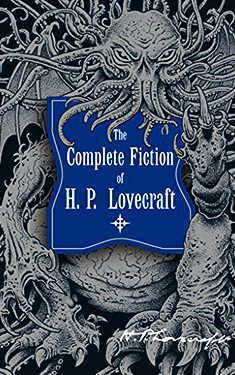HP Lovecraft
Completed 10/28/2020, Reviewed 10/28/2020
3 stars
I think I learned a lesson with this collection. Never read a complete works by any author. After a while, you see the flaws. I found the same words and phrases used over and over again. Lovecraft’s approach to horror is to not describe it in too much detail, but to use words like horror and terror repeatedly. I guess he leaves it to the reader’s imagination, but by the last story in this collection, I was tired of it. I felt like the only differences between the stories were the settings. Okay, so not all the stories were repetitive, but the Cthulhu mythos stories got old after a while. I have to say I was disappointed, but perhaps it was my fault in reading sixty-eight stories consecutively.
I read this for the WWEnd Halloween Challenge for 2020. I thought it would be fun to read some horror, and I always felt that I should read some Lovecraft as he is an influence on so many horror and fantasy writers. So when this book came up as a cheap Amazon Deal of the Day for my Kindle, I bought it. Well, it took me three weeks to read the 1095 pages. It started out fun, but soon I began to recognize the formula of the stories. For a large part of the stories, there’s an introduction to the main character, be it first or third person, that tells you that the person is dead or on the verge of sanity. There’s a prosy description of the setting. Then there’s a recounting of the horrific events that lead up to the death or mental breakdown. This was typical of the Cthulhu mythos stories.
There are other forms as well, such as the stories in what’s known as the Dream Cycle, which I had a hard time understanding. The stories which are not part of either Cthulhu or the Dreams still sometimes fell into the Cthulhu pattern of storytelling. You could tell when you were reading some of his early works because they ended in an italicized shocker last sentence. Those were actually kind of fun.
The prose is wonderful, as I would have expected from writing from this period in time. However, each story is a big prose-fest. There is almost no dialogue. When there is, it’s long, prosy, eloquent monologues or heavily accented backwoods ramblings. This lack of dialogue made the characters all seem basically the same. There was not much individual personality to them. Most of them were men, often academics, who were researching old cults and/or the occult, troubled by dreams, and obsessive. There were almost no women in any of the stories.
Most of Lovecraft’s work was published in periodicals, like the science fiction of the golden age. I think if you read his stories as they came out, over a period of many years, you could really get into it. You wouldn’t notice the commonly used words and phrases, the lack of growth in the writing, the repetitive themes. My conclusion is that reading it all at once is a bad idea.
And what review of Lovecraft isn’t complete without the acknowledgement of his intense racism. He uses derogatory language for anyone who isn’t white or of British descent. He used such language for Blacks, Asians, Native Americans, Asian Indians, Arabs, Italians, and people of mixed race. I’m sure I’m missing a few. I knew he was racist going into this and chalked it up to the time period he was from. But I quickly realized that while many authors were racist, they didn’t usually use derogatory words or stereotypical descriptions in their writings. And Lovecraft goes too far. He describes every non-white character with a slur. They are almost always associated with the horror involved, whether perpetuating it or a slave to it. It made for some really uncomfortable reading. I really like this quote by N. K. Jemisin from an interview with David Remnick from the New Yorker magazine. "…His biases were the basis of his horror. ... He does some incredible imagery, it's powerful work, but it's frightening ... because it's a way to look into the mind of a true bigot, and realize just how alien their thinking is, just how disturbing their ability to dehumanize their fellow human beings is."
I give
this book three stars out of five. It
was interesting reading this collection after reading so many books by authors
of color over the past few years. And it
was interesting reading it during such a troubling time as we are in now. It reinforced for me how far we’ve come and
simultaneously how much farther we have to go.
I think I would have given this collection four stars if it wasn’t for
the racism and the repetitive style and language of the stories. If you’re into prose, you’d see why I’d give
it the fourth star. But in the future,
when I read collections, I’ll make sure it isn’t massive. I like to be entertained and challenged. I don’t like finding out that an author has a
formula and sticks to it their whole career.
And I think I’ll stay away from the racists. It’s hard enough to do that in everyday life. I don’t need it in my literature as well.

No comments:
Post a Comment